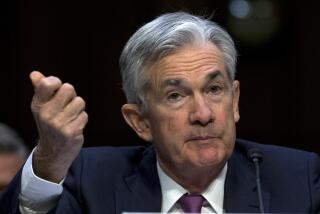What the oracle didn’t see
Alan Greenspan is surprised ... by human nature.
There was a kind of lion-in-winter quality to the testimony the former Federal Reserve Board chairman delivered to Congress on Thursday. Summoned before the House Oversight and Government Reform Committee, which is investigating the Wall Street meltdown, the onetime oracle of the global financial system told Chairman Henry A. Waxman (D-Beverly Hills):
“I made a mistake in presuming that the self-interests of organizations, specifically banks and others, were such as that they were best capable of protecting their own shareholders and their equity in the firms.”
Greenspan, 82, who relinquished leadership of the Fed just two years ago, said the collapse of the sub-prime mortgage industry -- and the vast, mostly hidden trade in derivative financial instruments it spawned -- exposed a “flaw” in his categorical reliance on free markets.
Over the last two decades, fortunes have been made and lost parsing Greenspan’s Delphic declarations, but there’s a breathtaking example of ideological blindness embedded in that first sentence. Does Greenspan really believe that banks, brokerages, rating agencies and insurance companies act of their own accord? Even he has to understand that the people who run them decide how they respond, even to market forces.
There are no autonomic reflexes in finance. Did Greenspan really believe that the people in power, presented with a chance to make a killing, would put the interests of their institutions and stockholders ahead of their own?
Put aside for a second the fact that the former Fed chairman spent more than 20 years of his life as a disciple of the novelist-turned-barely-baked-philosopher Ayn Rand, whose concepts of “rational egoism” and “individualism” put the “R” in ruthless and have provided generations of gullible undergraduates an intellectual rationale for their lingering adolescent self-absorption. Has Greenspan lived through the same times the rest of America has recently experienced?
The idea of loyalty -- or of just a sort of reciprocal obligation, for that matter -- simply doesn’t operate on Wall Street or much of anywhere in American business any more. The notion that CEOs and other executives would forgo a chance to enrich themselves to keep their institutions solvent or their stockholders’ investment whole seems quaint in today’s environment. That’s true even when the executives’ good conduct is supposedly guaranteed by an equity stake, as it is in investment banks.
What Greenspan and the rest of the aiders-and-abettors of Wall Street’s greed spree don’t want to admit is that there’s something wrong in the economy and financial system that new regulations on trading and disclosure won’t correct. Long before the financial system melted down, American business’ share of the social compact melted completely away. The corrosion didn’t begin at the top but at the bottom -- with the renunciation of any corporate loyalty toward working men and women. For nearly as long as Greenspan has hovered in the financial stratosphere, U.S. companies have been encouraged to treat their workers like any other “expense.” Wall Street has rewarded -- indeed, lionized -- companies “tough enough” to treat workers like the electric bill. Presto! Layoffs became “cost management.”
No one begrudges a company about to go out of business the right to cut payroll, but now nobody blinks when a CEO throws people out of work for an uptick in the stock price or to ease the service of ill-considered debt. It’s been a long time since anyone who analyzes the economy has been willing to say that it’s immoral for a profitable firm to deprive families of their income and health insurance, to strip hardworking men and women of labor’s dignity.
“I did not forecast a significant decline [in the housing market] because we had never had a significant decline in prices,” Greenspan told the committee, adding that the Fed’s record of economic foresight remains unequaled. “We can try to do better, but forecasting ... never gets to the point where it’s 100% accurate.”
Perhaps only an economic education prepares a man to draw as his conclusion from catastrophe the gnomic declaration that fallible human beings are not infallible. Some things, however, are true 100% of the time: Societies in which the few are allowed to fatten themselves without limit on the labor of many are not just; they aren’t even particularly productive for very long. Countries -- like companies -- that cling to notions that allow some to pursue their own interests by behaving indecently toward others come to bad ends.
There is no recovery from moral bankruptcy.
--
More to Read
Inside the business of entertainment
The Wide Shot brings you news, analysis and insights on everything from streaming wars to production — and what it all means for the future.
You may occasionally receive promotional content from the Los Angeles Times.










